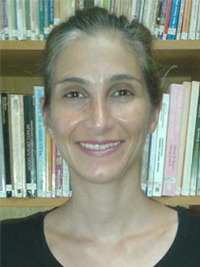Maìra Longhinotti Felippe

XXVII Cycle - (A.A. 2011-2012)
Architecture Technology
Home Institution: University of Ferrara
Without Scholarship
Curriculum: Architecture (ICAR12)
Research Topic: Restorative Hospital Environments
Tutor DA-UNIFE: Gabriele Lelli
Nationality: Italian Brazilian
Email: lngmra@unife.it
Profile
Biography
Maíra is graduated in Architecture and Urbanism (Federal University of Santa Catarina, Brazil, 1996-2001), holds a Master in Psychology (Federal University of Santa Catarina, Brazil, 2009-2010) and a Ph.D in Technology of Architecture (University of Ferrara, Italy, 2012-2015). From 2016 to 2018, she was a postdoctoral fellow at the Federal University of Santa Catarina (Brazil) and, since 2017, a Professor on a temporary contract in the same institution. She was part of the committee for the foundation of ABRAPA (Brazilian Association of Environmental Psychology and Person-Environment Relationships), having been elected as a member of the first board of directors. She is also a member of the Environmental Psychology Working Group of the National Association for Research and Post-Graduation in Psychology (ANPEPP) in Brazil. Her current research focuses on how healthcare environments can become restorative based on their physical characteristics and the relation that people establish with the place.
Research skills
Environmental Psychology | Post-Occupancy Evaluation | Evidence-Based Design | Restorative Environments | Environmental Meaning
Scientific activities
ORCID ID:
0000-0001-9483-1654
IRIS UNIFE ID:
rp11392
Doctoral research
Physical environment and environmental language in the affective stress restoration process in paediatric inpatient rooms
Environmental messages communicated by the physical environment are considered a source of stress in hospitals when represented by negative meanings. In the present study, it is assumed that the hospital physical environment, through its meaning, allows or even promotes affective stress restoration when raises positive cognitions and affects. In this way, it was proposed to identify visual physical attributes of pediatric inpatient rooms that communicate environmental messages related to affective stress restoration. In total, 124 pediatric patients from the age of 8 and 66 parents participated in the study. The investigation was conducted in pediatric inpatient rooms of four hospitals in north-central Italy. Data collection took place in two phases, comprising: (a) direct observation of the physical environment, observation of traces, administration of questionnaires, as well as consultation to medical records and architectural plans (Phase 1); (b) semi-structured interviews with patients (Phase 2). It was possible to empirically establish a relation between environmental meaning and affective stress restoration. A better environmental evaluation was associated with a greater restoration. In addition, restoration was greater the more patients considered the hospital room as reassuring, orderly, cheerful, relaxing, comfortable, with fresh air, spacious, pleasant and lively. It was found that the following physical attributes play a role in the construction of these meanings: residential appearance, fresh air, visual and physical access to natural outdoors, moderate amplitude, opportunities for privacy and social interaction, access to technologies, illustrations on the wall, support for parents’ needs, presence of play areas, conservation of the healthcare facility.
Keywords
Paediatric Hospital | Environmental Meaning | Stress Restoration | Restorative Environment | Evidence-Based Design

